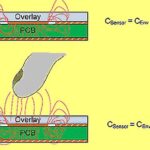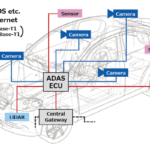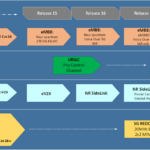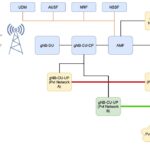 ACCES I/O Products announces the immediate release of two new embedded PCI Express-based families of high-performance and low-cost analog I/O cards – the mPCIe-AIO Family and the M.2-AIO Family. These innovative families of 16-bit and 12-bit ADC cards start with the flagship models, the mPCIe-AIO16-16FDS and the M.2- AIO16-16FDS (NVME compatible!).
ACCES I/O Products announces the immediate release of two new embedded PCI Express-based families of high-performance and low-cost analog I/O cards – the mPCIe-AIO Family and the M.2-AIO Family. These innovative families of 16-bit and 12-bit ADC cards start with the flagship models, the mPCIe-AIO16-16FDS and the M.2- AIO16-16FDS (NVME compatible!).
ACCES’ mPCIe and M.2 high-speed, 16-bit multifunction analog input/output cards are ideal for precision measurement, analysis, monitoring, and control in countless embedded applications found in rugged or industrial environments. Each design can sample inputs at speeds up to 2Msps for the board’s 16 single-ended or 8 differential analog input channels (1MHz acquired simultaneously on each of two analog input paths). Standard features include four 16-bit analog outputs and two high-current digital I/O lines — all contained on the ultra-small mPCIe F1 or M.2 2260/2280 embedded form factors. Striking an excellent price/performance balance, these families also include models with slower A/D speeds, optional analog outputs, and lower-performance 12-bit modules, for less demanding applications.
Each form factor offers over a dozen models with list prices ranging from only $299 to $839, an unprecedented value in such a small package. The cards feature seven software-selectable per-channel analog voltage input ranges, including 4-20mA current inputs (factory option). This channel-by-channel programmable gain feature enables the measurement of an assortment of large and small signals in one scan—all under software control at up to 1MHz. Two simultaneously sampling ADCs provide unique benefits in multi-channel vibration and transient analysis, and the 4 samples of FIFO+DMA-driven data are optimum where high data rates must be sustained for short—or long— periods of time.
The four analog outputs each have five software selectable ranges and can drive up to 10mA. The flagship FDS models add hardware-paced 8 samples FIFO+DMA-driven Streaming Waveform Playback on one, two, three, or all four DACs, at any aggregate rate up to 1Msps. The two pulled-up digital I/O pins can be used independently as simple input or output, external ADC trigger, ADC start conversion, DAC trigger (LDAC), watchdog status output, and more! The cards have been designed for use in harsh and rugged environments such as military and defense along with consumer/industrial applications such as medical, point of sale systems, kiosk design, retail, hospitality, automation, gaming, and more.
Key features of the mPCIe-AIO and M.2-AIO Families include: PCI Express Mini Card (mPCIe) Type F1 or M.2 Type B/M 2260/2280, with latching I/O connector; 2× 16-bit, bipolar, differential, A/D converters sampling at up to 1MHZ, simultaneously (2Msps); Software selectable as 16+0, 8+4, or 0+8 (single-ended + differential inputs); Seven channel-by-channel Programmable differential input ranges from ±0.3125V up to ±12V; A/D starts via software, external input, or periodic timer; A/D “scan start” mode optimizes inter-channel timing, reducing skew; High Impedance, 16-channel input: 500 MΩ; 4 sample FIFO+DMA for efficient, robust data streaming; Two digital I/O with flexible secondary functions; Four 16-bit analog outputs with optional 8 sample FIFO+DMA Waveform Streaming; 5 per-channel programmable ranges: 0-5V, 0-10V, ±2.5V, ±5V, ±10V; Outputs drive ±10mA; Onboard watchdog with status output; RoHS compliant standard;
All ACCES mPCIe and M.2 cards offer high retention latching connectors for shock and vibration mitigation as well as an optional extended operating temperature of -40°C to +85°C. The small size (mPCIe Type F1: 30mm x 50.95mm and M.2 2260/2280: 22mm x 60mm/80mm) allows for maximum performance in applications where space is a valuable resource. The mPCIe form factor has proven itself over time and the newer M.2 form factor provides an even smaller footprint for embedded applications where compact size is critical. Both Families share the same register map and I/O pinout, making moving to either design a straightforward change. This M.2 card is compatible with standard NVME sockets, common on all modern motherboards.
Factory Options Include: Extended temperature, current inputs (4-20mA, 10-50mA), voltage dividers for higher voltage inputs. Additional customization options include conformal coating, custom software/product labeling, and more — even entirely new features, enabled by our advanced FPGA-based design.
These cards are supported for use in most operating systems and include a free Linux and Windows compatible software package. This package contains sample programs and source code in C# and Delphi for Windows. Linux support includes installation files and samples for programming levels via our open-source kernel driver. Third-party support includes a Windows standard DLL API library usable from most popular application programs. Embedded OS support includes the family of Windows Operating Systems including IoT. ACCES also now offers a VxWorks driver/library for the ultimate real-time process monitoring and control solution.




